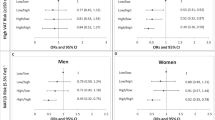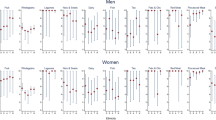Abstract
Objectives: To compare dietary fat intake, the accuracy of individuals’ awareness about their fat intake, and sociodemographic and psychosocial correlates of awareness, in Dutch and American samples of employed adults. A discrepancy between objective dietary intake data and subjective self-evaluation of dietary fat consumption has been recognized in the past and might undermine healthy diet promotion interventions, and this is important because people who believe that their diets are healthful are less likely to be interested in making changes. Further, international comparisons have not been examined to date. Design: Data collected for the baseline surveys of the ‘Healthy Bergeijk’ study in the Netherlands and the ‘Working Well Trial’ in the United States were compared. Subjects: Working adults from a Dutch community health intervention study (n=768) and an American worksite health promotion trial (n=15 440). Main outcome measures: Objectively assessed dietary fat intake, measured by food frequency questionnaires, and subjective ratings of fat intake (self-rated fat intake). Results: Findings show that the Dutch respondents had higher objectively assessed fat intake and lower subjective ratings of fat intake (P<0.001). American respondents perceived their diets as higher in fat, more often stated their intentions to reduce fat intake, and were slightly more likely to make realistic estimates of their dietary fat. Dutch subjects were significantly more likely to underestimate their fat intakes. In both samples, women were most likely to underestimate their fat consumption and the most educated persons were most likely to be realistic. Conclusions: A substantial proportion of adults, both in the United States and the Netherlands, lack accurate awareness about how much fat they consume, though errors tend to be in opposite directions in the two countries. This study is an important first step toward broadening our international understanding of human dietary behavior for disease prevention. Sponsorship: The Working Well Trial was supported by a Cooperative Agreement from the National Cancer Institute, grants no. U01 CA51671, U01 CA51686, U01 CA51687, U01 CA 51688, and P01 CA 50087. The Healthy Bergeijk project was supported by a grant from the Dutch Cancer Society.
This is a preview of subscription content, access via your institution
Access options
Subscribe to this journal
Receive 12 print issues and online access
$259.00 per year
only $21.58 per issue
Buy this article
- Purchase on Springer Link
- Instant access to full article PDF
Prices may be subject to local taxes which are calculated during checkout
Similar content being viewed by others
Author information
Authors and Affiliations
Rights and permissions
About this article
Cite this article
Glanz, K., Brug, J. & van Assema, P. Are awareness of dietary fat intake and actual fat consumption associated?—A Dutch--American Comparison. Eur J Clin Nutr 51, 542–547 (1997). https://doi.org/10.1038/sj.ejcn.1600442
Received:
Revised:
Accepted:
Issue Date:
DOI: https://doi.org/10.1038/sj.ejcn.1600442
Keywords
This article is cited by
-
Self-perception of dietary quality and adherence to food groups dietary recommendations among Mexican adults
Nutrition Journal (2020)
-
Connecting Health and Technology (CHAT): protocol of a randomized controlled trial to improve nutrition behaviours using mobile devices and tailored text messaging in young adults
BMC Public Health (2012)
-
Barriers to healthy nutrition: perceptions and experiences of Iranian women
BMC Public Health (2012)
-
A New Method for Measuring Meal Intake in Humans via Automated Wrist Motion Tracking
Applied Psychophysiology and Biofeedback (2012)
-
Efficacy and Use of an Internet-delivered Computer-tailored Lifestyle Intervention, Targeting Saturated Fat Intake, Physical Activity and Smoking Cessation: A Randomized Controlled Trial
Annals of Behavioral Medicine (2008)



